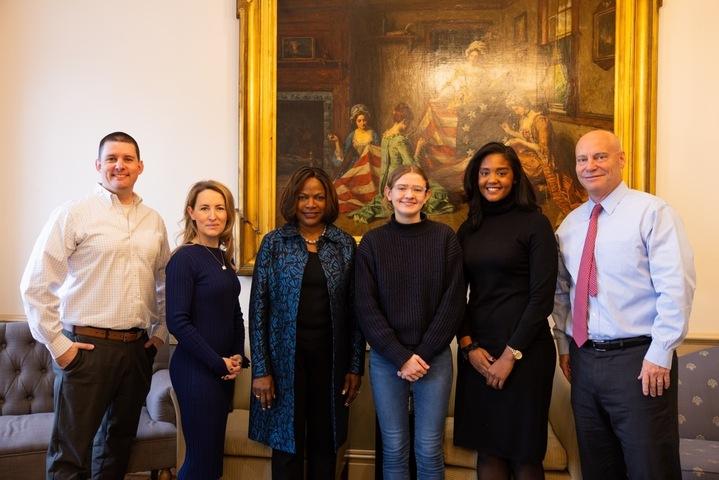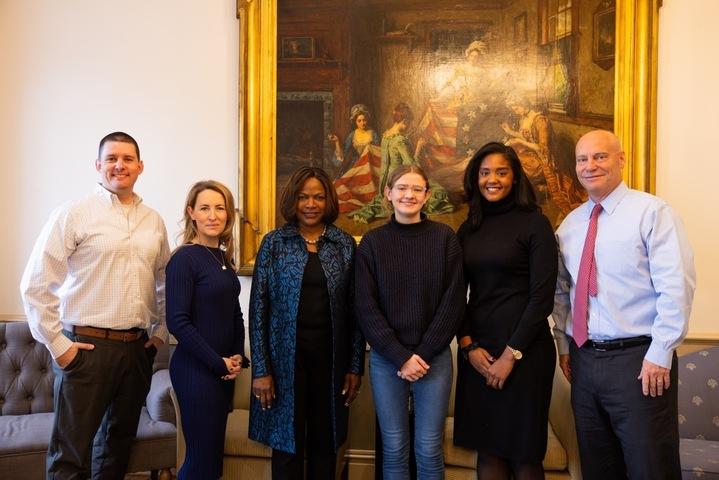The Hoya sat down with the Georgetown University Institute of Politics and Public Service (GU Politics) fellows for the Spring 2024 semester Jan. 19 to discuss the ongoing presidential campaign, Gen Z’s political future and challenges like foreign aggression and domestic polarization the United States currently faces.
This semester’s fellows are Laura Barrón-López, PBS NewsHour’s White House correspondent; Machalagh Carr, the former chief of staff to ex-Speaker of the House Kevin McCarthy (R-Calif.); Val Demings, a former U.S. Representative (D-Fla.); Dan Lamothe, the Washington Post’s Pentagon correspondent; Deanne Millison, the former chief economic advisor to Vice President Kamala Harris; and Marc Short, the legislative director to former President Donald Trump and chief of staff to former Vice President Mike Pence. Barrón-López could not attend the conversation with The Hoya.
The six fellows will hold weekly discussion groups with students throughout the semester to discuss current issues in American and global politics, starting Feb. 5. Any student is welcome to join these walk-in discussions; no signup is necessary.
Below is a partial transcript of the fellows’ discussion of American politics, their plans for the semester and advice to students.
What are the two biggest challenges, one foreign and one domestic, for the new president when they’re inaugurated?
Demings: Foreign, it’s continuing to provide the necessary leadership around the world to make sure that we have the environment to promote strong democracies around the world. Domestically, right now, normally, I would say the economy — these are not normal times — but I think remembering that we are the United States of America during tough times. It’s unity.
Short: From a foreign policy perspective, you have a country that’s weary, since 2001 having been at war. Yet at the same time, there’s probably more threats we face. Whether or not that’s emboldening Iran, seeing China on the rise, seeing Putin feeling like he has opportunity for more aggression and a divided country here about whether those are worthwhile efforts for us to participate in. I would say, domestically, I think it’s both the economy, and I think it’s the border.
Lamothe: Domestically, I would say our nation’s toxic politics. Internationally, I would say, some combination of Russia and China and their increasingly aggressive outlook toward neighbors, our allies, our partners and what that could mean.
What do you think is the biggest issue, politically, facing Gen Z today? How can candidates from each party best engage young voters?
Demings: It’s providing an environment where young people stay engaged and feel like their future can perpetuate the American dream, that you will be able to get the education that you want to succeed, that you will be able to own a home — the greatest symbol of the American dream — that in your senior years, that will eventually get here, that you will be able to take care of yourself.

Carr: You can’t afford an education in this country that doesn’t put you in debt. That education will not allow you to get a job or to pay off the debt and buy a home.
Millison: The isolation and loneliness. That happened before COVID, continues after COVID and I think that our younger generation, Gen Z generation, is the most susceptible to that. And I don’t think we know exactly what to do about it.
How do you plan to facilitate dialogue in your discussion groups at Georgetown with students from across the political spectrum?
Demings: Well, while I do quite a bit of talking, I think that we should do more listening, because this is not just about our interaction with the students. It’s also about what we can learn, and how we can use that knowledge in our various positions.
Carr: When we go back to first principles, the vast majority of people want very, very similar things. The differences come about in how to get there. And I think we can help by kind of peeling back some of those layers and taking it back to a place where everyone agrees.
What do you think are the biggest challenges facing the Republicans and Democrats, respectively, this election cycle?
Short: I’d say the biggest challenge for both parties is that the vast majority of American people don’t want either of the options they’re presenting.
Millison: I would say for the Democrats, it’s that the White House has been in power for the past four years, done a lot of work, but people don’t know it. So it’s explaining to people and having people understand the work they’ve done and how they’ve impacted their lives.
Carr: I think for Republicans, it’s communicating what their message is. Are they a party that is promising vengeance and death and destruction? Or are they a party that promises something that will help the American people move forward?
What’s one piece of advice you would give to students that you wish you had at the beginning of your career?
Lamothe: My career is nothing like what I thought it would be when I was 22. I never would have anticipated this. So don’t sweat it. When the door’s slammed in your face, find a window.
Millison: I wish I had done this — to spend a little more time thinking about what I really wanted to do. It turns out college, that was the time I had the most amount of time to really be selfish and think about me and do things that only I wanted to do.
Short: Don’t sweat a five year plan. I think God’s gonna open doors for you and close doors for you and try to be understanding of what he’s doing in your life.
Who do you think the Republican nominee will be this year?
All: Trump.
Who do you think will win the presidential election?
All: Joe Biden.
Short: I say head to head, Joe Biden. I think the question is whether it becomes a multi-candidate race, because I think that favors Trump.
What’s one prediction you have for the general state of American politics in the next five years?
Millison: I think with younger folks coming in, you’ll see more use of social media, and we’ll see that be more successful.
Lamothe: We’re going to eventually see an emergence of a younger political class — and maybe this is optimism — but at some point, we’ll see younger people with new energy in very senior positions.
Demings: We’ve seen America bounce back through some pretty tough times, and, wow, it seems so dark and dreary and gloomy right now. We’re going to be okay in five years.
















